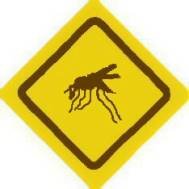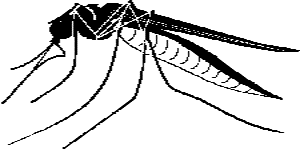
 |
MALARIAHow to avoid and recognize Malaria while traveling
Malaria affects 500 million people worldwide and kills at least 2 million Africans die yearly (mostly children). In returning travelers over 30,000 Europeans and North Americans are affected.
Anopheles mosquitoes carry the 4 different severity of diseases.
Anopheles are identified by the way they bite (head downward when biting) compared with Culex mosquitoes that stand parallel. This distinction is impractical and only of interest.
Female mosquitoes of Anopheles type bite at night or twilight. Urbanizations may create areas where mosquitoes may breed close to people (stagnant water). Mosquitoes don't travel more tan 2 miles from where bred. Weird exceptions are noticed-airport malaria acquired by passenger bitten by mosquitoes indoors during stopovers. Wind could also blow mosquitoes further away. Only female mosquitoes drain blood.
A mosquito bites an infected person and the malarial parasite as a gamocyte enters the mosquito and then breeds internally creating oocytes and then sporocites, which travel to mosquitoes salivary glands. Humans become infected with mosquito's saliva containing these sporocites. They can penetrate the liver within 45 minutes. Within 9-16 days they become merozites, which invade red blood cells and liver cells. Blood cells rupture, releasing gametocytes and merozites, which cause the continued cycle of fevers and chills in the human host.
Different malarial species have different severity of diseases, all bad, but some are lethal very quickly. Sometimes malaria is very easy to recognize, and it could take months or years before it is suspected. Symptoms of malaria can start off subtly and become more sever. These include flu like attacks, with fever and chills, which ay lead to multi-organ failure and death. Malaria medication lessens the symptoms of malaria, but does not guarantee immunity. While taking malaria medication travelers may still catch malaria, but the medication travelers may still catch malaria, but the medication will help prevent life threatening malaria that could kill before reaching medical attention. Any malarial smears. A negative smear still does not rule out malaria, as smears may not “catch” parasites on microscopic analysis. General Assumption- any returning traveler with fever has malaria, until proven otherwise, especially if they are coming from sub-Saharan Africa.
Many other infectious diseases many also manifest as flu like symptoms, but malaria is the one diagnosis not to miss.
Many other mosquitoes co-exist with the Anopheles mosquito-Ades aegypti, Culex, Haemogogus, Sabethes, and Masonia, which cause other diseases like yellow fever, filariasis, viral encephalitis, dengue and other hemorrhagic fevers.
Other insects (tse tse flies, black flies, deerflies, sand flies, lice, ticks and mites) cause a variety of illnesses many of which have no known vaccine or medication to prevent illness as well as no good treatment. General recommendations are to avoid all insects similar to malarial mosquitoes.
Prevention is best accomplished by avoiding being bitten. Wear long sleeved shirts and long pants. Use insect repellent, sleep under a mosquito net, use mosquito coils, don't sleep on the ground, and check for ticks and insect bites daily.
Be knowledgeable of the signs and symptoms of the diseases you may likely encounter where you are traveling.
Types of Medication to Prevent Malaria (chemoproplylaxis)
Chloroquine - Cheap, well-tolerated but bitter taste and can upset stomach and blur vision. There are many areas resistant to chloroquine. Taken weekly.
Mefloquine (larium) - More expensive but 2-5% of people report side effects (anxiety, nausea, hair loss, poor sleep, irritation). Taken weekly, and is used where there is chloroquine resistance. Not recommended for those with cardiac conditions who are being treated with Beta Blockers, or Quinine, or those with depression. Safe in the second or third trimester of pregnancy.
Doxycycline - Daily medication used where there is Mefloquine resistance or as an alternative to Mefloquine. Side effects include stomach irritation and photosensitivity. *Not for: nursing moms, pregnant women, or those under age eight. *Dose may need to be adjusted for those people taking Coumadin or antiepileptic medication. Malarone New medication that needs to be started 2 days prior to travel and 7 days after. It has less side effects than mefloquine but is more expensive. It may be used as an alternative to some other medications. *Not given to those with severe kidney disease
Taking Malaria Medication
Medication should be taken before the trip (1 week for chloroquine and mefloquine, 2 days for doxycycline, and 1-2 days for malarone) in order to build up a blood concentration; during the trip; and after the trip is over, in order to kill off any parasites inside the liver (this is 4 weeks for chloroquine, mefloquine and doxycycline but only 7 days for malarone).
Malaria Self-Treatment
Travelers often use portable tests and then treat themselves. Studies have shown that travelers over-treat themselves. Also large doses of malaria drugs in a sick person are not without side effects. Self-treatment is not recommended by our clinic. Instead we recommend preventative measures and to seek medical attention promptly. Ninety percent of travelers with malaria do not become ill until after they return home. This illusion of good health may foster laxity of mosquito precautions. Taking medications to prevent malaria is not a perfect solution but is still over all best way to prevent malaria.
The decision to take malaria medication should be based on each individual traveler's health, itinerary and activities. What works well for one may not necessarily work well for others. Skylark Medical Clinic264 Tache Avenue Winnipeg, MB R2H 1Z9 Ph: 453-9107 Fax: 453-9115 Website:
www.skylarkmedicalclinic.com
|
 |

